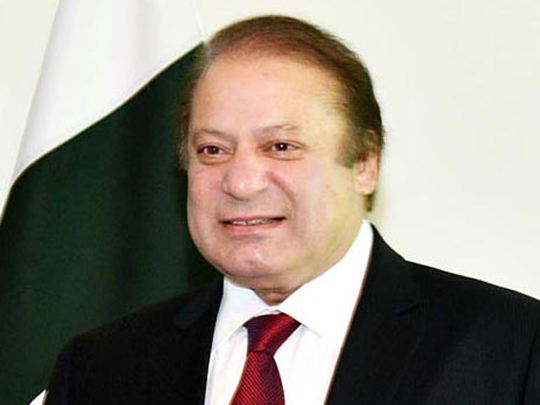
When Pakistan’s prime minister Nawaz Sharif and Iran’s president Hasan Rouhani renewed a commitment earlier this month to oversee an ambitious gas pipeline laid down from Iran to Pakistan, they failed to clear the many lingering doubts surrounding the multi-billion dollar project.
The landmark project could clearly become the basis for pouring billions of dollars in Iran’s sanctioned economy while injecting a breath of fresh air in Pakistan’s increasingly troublesome prospects.
For Sharif, importing gas from Iran could lay the basis for future economic stability of Pakistan while also consolidating a potentially fragile aspect of domestic politics. In recent years, increasingly painful energy shortages across Pakistan have been evident in the shape of frequent electricity and gas shortages that have had a crippling impact on daily life.
It is therefore not surprising that Sharif sees his government’s ability to tackle these shortages as a key first step towards improving Pakistan’s outlook. Sharif may indeed also have an eye on an apparent recent thaw between Iran and Saudi Arabia — the predominant power in the Middle East, following a Saudi invitation to Iran’s foreign minister to visit the kingdom. Pakistan has historically sought to follow an element of equidistance in its relations with Iran and Saudi Arabia. Growing contacts between those two Middle Eastern players now helps to lift confidence among Islamabad’s Middle East policy architects.
Going forward, an important upside to Pakistan’s growing engagement with Iran may well come in the shape of fresh possibilities for a joint approach to the future of Afghanistan. The Pak-Iran axis has a greater possibility for influencing the future of Afghanistan than any other players combined together.
While there are endless opportunities for taking Pak-Iran relations to previously unexplored frontiers, Sharif’s ability to deliver his side of the bargain must principally depend on two equally vital parameters.
On the one hand, the Sharif government’s continued failure to tackle Pakistan’s internal security environment will only add to the country’s worsening domestic outlook. More vitally, such a deterioration will make it practically impossible for Pakistan and Iran to pursue vital projects like the gas pipeline from Iran.
For years, Pakistan’s security forces have battled a stubborn separatist insurgency in the south-western Balochistan province which borders Iran. For the pipeline project to succeed, Sharif will have to oversee a discernible improvement in security across Balochistan.
On the other hand, Sharif must also oversee a significant improvement in Pakistan’s economic prospects to lift the spending ability of the country’s large population of consumers. Armed with a population of about 200 million, Pakistan indeed has a significant market size to attract investors in a range of projects.
In recent months, Ishaq Dar, the finance minister, has repeatedly claimed to have overseen a stabilisation of Pakistan’s largely dysfunctional economy. Events such a relative improvement in the exchange rate of the rupee versus the US dollar and a successful recent launch of an international bond by Pakistan worth $2billion (Dh7.34 billion), have been used by Dar among tangible bits of evidence to back his claim. Yet, nothing could be more fallacious.
The broad contours of Pakistan’s economy must be seen within the context of large gaps surrounding key parameters. More than one-third of Pakistan’s population lives in extreme poverty. Sharif just like his predecessors also remains victim to an exceedingly narrow base of taxpayers given that just about one per cent of Pakistan’s population pays an income tax. Together, a failure to fill the two gaps will keep on blocking any rejuvenation of Pakistan’s economy.
If indeed Sharif’s vision of an economically revitalised Pakistan is to succeed, he must oversee a radical change to widespread tax evasion. Such a transition will mark a crucial step in improving the government’s ability to speed up the pace of Pakistan’s badly needed infrastructure development.
On the contrary, a failure to act on these vital fronts will continue to force Pakistan through a recurring periodic of cash crunch that has hampered the country’s past economic performance. Perhaps last but not the least, Sharif must move quickly and decisively to end domestic political discord of the kind that has often strained Pakistan’s prospects in the past. For months, the prime minister appears to have resisted calls from within Pakistan’s influential army, seeking a removal of curbs on retired General Pervez Musharraf.
The former military ruler who seized power in a 1999 coup that replaced Sharif as the prime minister, is presently confined to his well fortified home in an upper class neighbourhood of the port city of Karachi. After his recent indictment on charges of high treason related to the imposition of emergency rule in 2007 when Musharraf ruled over Pakistan, the former military ruler has so far been barred by Sharif’s government from travelling abroad to visit his ailing mother.
The deadlock is apparently driven by Sharif’s personal vendetta as he seeks to settle scores with his former nemesis. Ironically though, a fight between the two men appears to have jeopardised Pakistan’s civil-military relations in a way that has seldom been seen before.
Sharif has a historic opportunity to give a new direction to Pakistan. But his ability to succeed must depend on the choices he is prepared to make on his home turf, notwithstanding his eagerness to push for Pakistan’s closer ties with key foreign partners such as Iran. Ultimately, the future of Pakistan rather than a push to settle past scores must become Sharif’s objective.
Farhan Bokhari is a Pakistan-based commentator who writes on political and economic matters.












